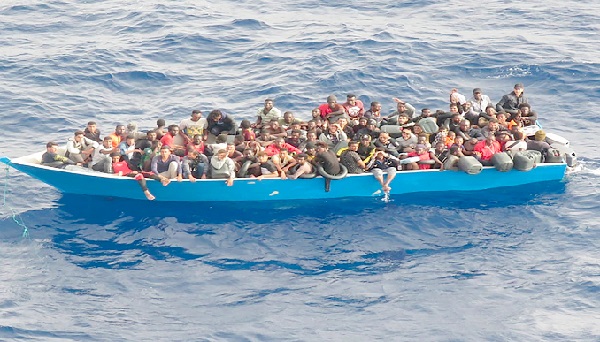
Migration and the Racialisation of Space: Does race determine belonging?
Bonn, March 18, 2024. The racist ideas that led to the January 2024 demonstrations in Germany illustrate the problem with the racialisation of space, which means the use of race to determine belonging.
Advertisement
The racialised anti-immigration rhetoric in countries that see themselves as inundated by migrants is oblivious to both historical and contemporary migration trajectories and trends.
Migration is not uni-directional and there is no binary division of roles in which countries either send or receive migrants. Rather, countries, regardless of their economic status, fall into a complex intertwinement of roles in which they are simultaneously sending, receiving and serving as transit countries.
The ahistorical, binary and reductionist conceptualisation of human mobility is spawned by a disconnect between the anti-immigration racialisation of space and the historical and contemporary realities of migration. People who hold anti-immigrant sentiments can learn from these realities.
The racialisation of space thrives on the conflation of racial differences with deficiency and danger. It generates a correspondingly racialised migration lexicon that uses binary terminologies to name and describe people moving in different directions. This lexicon depicts migrants from high-to-low- and middle-income countries as benefactors and an asset to their host countries and cloaks them in positive terminologies such as expatriates, lifestyle migrants, global citizens and cosmopolitans.
In contrast, it portrays people migrating from low and middle-income to high-income countries as asylum seekers and refugees who are beneficiaries of and a threat to their host countries. These categories are accompanied by verbs that follow the same contours of the high-income-low-income divide, in which the former travel from “normal” places and are wanted and welcome, while the latter flee from “deviant” ones and are undesirable and not welcome. Migrants from high-income countries enjoy normalised and celebrated visibility whereas migrants from low and middle-income countries suffer from problematised and criminalising visibility.
Contrast
This boils down to a tenuous distinction between racialised mobile people from high-income countries who ostensibly move legally with good intentions and racialised migrants from low- and middle-income countries whose movement is presumably illegal and motivated by “stealing” jobs from citizens, terrorism and other sinister agendas.
Segments of society that hold anti-immigration views can learn from historical migrations that have reconfigured the racial composition of countries around the world. Historical and contemporary migration trajectories show that migration is not as simplistic as it is portrayed by individuals who see their countries as exclusively receiving migrants. It is complex and contradictory. Colonial history is characterised by the migration of European settlers. When the colonised countries became independent, this did not lead to the deportation of European settlers in an attempt to turn the clock back to the precolonial demographic composition.
In contrast to the imagination of the so-called Sub-Saharan Africa as black, parts of this region are multi-racial due to historical and contemporary migrations from outside the continent. Although racial tensions persist because of historical grievances surrounding the land question, former settler colonies such as Namibia, South Africa and Zimbabwe embrace descendants of the colonial settlers and contemporary immigrants from Europe and other parts of the world as citizens who represent them in, for example, business, politics, sports and culture.
Yet, in some kind of distorted reading of history, anti-immigrant views in former colonial powers equate the individual motivations of contemporary migrants from disparate “non-white” backgrounds with the same dispossession and the cultural dislocation that characterised colonisation.
History
Repudiating history and promoting racialised notions of citizenship and belonging have global ramifications. The world needs cooperation among societies rather than globally polarising racist views reminiscent of Idi Amin’s expulsion of South Asians from Uganda in 1972 or, in recent times, the racially charged land reform in Zimbabwe, the sharp increase in attacks on refugees and their accommodation in Germany and the racially motivated attacks on Asians in the US.
People who express racialised views on citizenship and belonging in countries that present themselves as citadels of democracy and human rights can learn from indigenous people in former settler colonies.
For example, the former settler colonies in Southern Africa cited above, despite their tortured colonial histories, welcome migrants and take an all-inclusive non-racialised understanding of citizenship, belonging and human rights. To insist on the racialisation of one’s own country is to insist on the same elsewhere.
The writer is a Senior Researcher at the German Institute of Development and Sustainability (IDOS).




